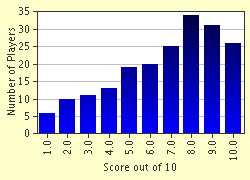Quiz Answer Key and Fun Facts
1. When we last left the tale we were following the story of Mr. Bernstein, Charles Foster Kane's assistant. Bernstein recollects the early days of the 'New York Inquirer', a newspaper owned and managed by Kane. One of Mr. Kane's first acts as the new publisher of the 'Inquirer' is to include a personal statement on the front page of the paper. What title does he give this statement?
2. Kane, Leland and Bernstein look hopefully at the front window of the 'Inquirer' building. At this point, the circulation of the 'Inquirer' is only 26,000, but they intend to change this. The three men are then shown looking enviously at the front window of the rival 'Chronicle's' building, with the front window reading 'Circulation: 495,000'.
Kane claims that it took 20 years for the 'Chronicle' to assemble their newspaper writing team. How long does it take him to acquire the entire 'Chronicle' writing staff for his paper?
3. After a celebratory gala, Kane leaves for Europe for an extended vacation, leaving Leland and Bernstein to run the newspaper. Kane does not leave the two of them empty-handed, however. From Europe he sends dozens of art pieces, mostly statues. Which of these other items does Kane specifically mention he is after in a letter?
4. Following Kane's return from Europe, we discover that he will soon be married. His soon-to-be wife, Emily, is no less than the niece of the President of the United States. What is her family name?
5. After receiving nothing from Bernstein about 'Rosebud', the reporter Mr. Thompson decides to have a visit with Kane's old friend Jed Leland. The cynical and elderly Leland has plenty of gossip for Thompson, not being entirely too fond of his former employer and long-time pal Kane. In fact, what does Leland call himself in relation to Kane?
6. During his interview, Leland reveals something very profound and tragic about Charles Foster Kane. According to this old friend of Kane, what is the only thing the newspaper man really ever wanted out of life?
7. Leland reveals several stories about Kane that allow reversions to flashbacks. In one such moment, the viewer is taken back to the moment that Mr. Kane met his second wife, Susan Alexander. From what ailment is Susan suffering on that dark, damp night?
8. The next Leland-related flashback depicted is that of Charlie Kane's run for governor. During his governor's run, who was his hated and much-maligned opponent?
9. Despite his love affair with Susan Alexander being revealed to the world by his crooked opponent, Kane continues his political campaign. The night of the election, his publishing crew at Kane's 'Inquirer' are deciding between two newspaper headlines. One reads 'Kane elected', and will be used in the case that he wins. What will the headline read if his campaign fails?
10. In one of the most interesting and revealing scenes in the film, Kane confronts a drunken Leland the day after the election. During their discussion, Leland mispronounces a word. Which word does he unintentionally slur?
Source: Author
thejazzkickazz
This quiz was reviewed by FunTrivia editor
skunkee before going online.
Any errors found in FunTrivia content are routinely corrected through our feedback system.

